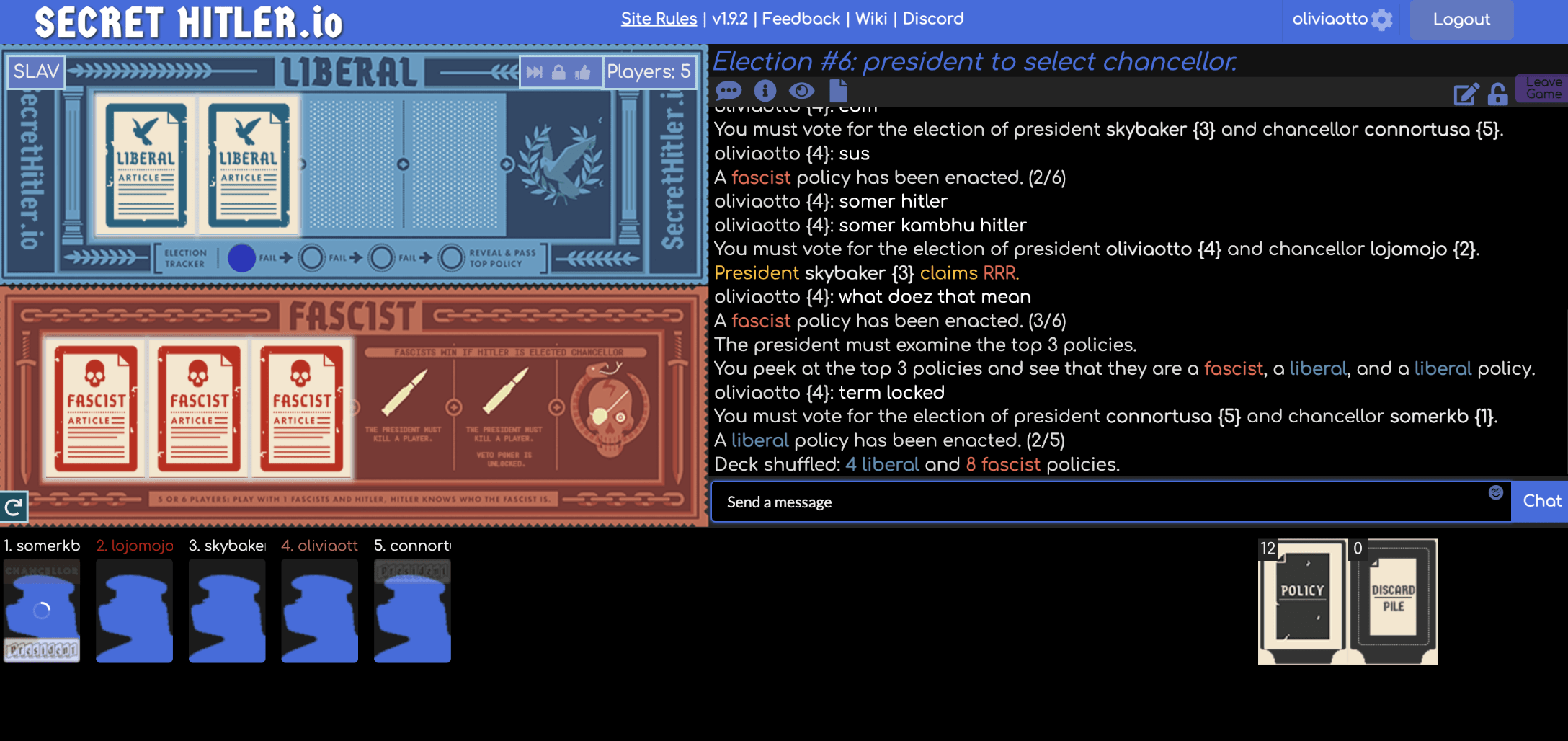The game that I chose to play for this assignment was Secret Hitler, a game created by Goat, Wolf, & Cabbage LLC. The game was originally developed and sold as a physical board game, but for this assignment, I played it online first at secret-hitler.com and then at secrethitler.io . The target audience seems to be people who are at least mildly interested in politics and/or history, seeing as the story wrapping the basic game mechanics is about a fascist uprising in the year 1932. Furthermore, the two teams of players are referred to as ‘liberals’ and ‘fascists’ rather than more general terms like ‘heroes’ and ‘villains’. By adding in this specificity and including a historical background story, it seems clear to me that the game creators are hoping to entice history buffs and political junkies.
Secret Hitler requires at least 5 players for gameplay, and each player is secretly assigned the role of ‘liberal’, ‘fascist’, or ‘Hitler’ at the start of the game. Each round, a new player becomes the President and that player is in charge of nominating another player to become the Chancellor for that round. If the majority of the players vote for this proposed government, the President then receives 3 policy cards. The President then secretly chooses 2 out of the 3 cards to pass to the Chancellor, and the Chancellor has to pick one of them to enact. Secret Hitler is a team competition game, but if all the fascists except for Hitler are killed/exposed, it can transform into a unilateral competition. Additionally, the objective of the fascists is for their team to win by either electing Hitler to the government after 3 fascist policy cards have been played, or by having 6 fascist policy cards played. Thus as the game goes on, the fascist team may pivot goals from one to the other depending on which seems more feasible.
According to Wikipedia, Secret Hitler is a “hidden identity social deduction party game”, placing it in the same category as Mafia/Werewolf, Chameleon, and Among Us. It’s quite similar to these games in the sense that no one knows the roles of the other players, and that the “imposter” players are expected to lie and bluff their way into gaining the other players’ trust. Secret Hitler is unique, however, not only in its 1930s German theme, but also in that there are multiple ways for the game to end — liberals can enact 5 policies, fascists can enact 6 policies, or Hitler can get elected after 3 policies; in other social deduction games, there are typically only two different ways that the game can end, so I think this is something that makes this game very cool. I also believe that Secret Hitler’s rules are a bit more complex than the other games that I mentioned. I think that this allows for the game to be targeted at a slightly older crowd of players, but it also serves as a weakness because it’s harder to teach new players how to play.
I did find this game to be a lot of fun, but I also found it quite confusing at first. I was playing with a group of 5 people and it was 3 of our first times playing so the first round was a bit messy as we were all a little lost. We played a few rounds, however, and it got exponentially more fun the longer that we played since we all began to gain a better understanding of what was going on. We started out by playing the game on secret-hitler.com, but after one round we switched over to secrethitler.io because we found the user interface to be too unclear. The first round also involved one or two of our first-time players accidentally revealing their roles because they were unsure of what to do. The final two rounds that we played were extremely fun, in my opinion, because each time we had someone who the entire group was 100% sure was a liberal end up being a fascist which was an entertaining surprise. I don’t think many changes need to be made to the game to make it better, but I do think that there could be a better set of instructions or a quick onboarding video for the online versions because I found the existing set of written rules to be a bit confusing. The website we were using would also give occasional updates on how many liberal and fascist policy cards were left in the deck which I found unnecessary and led to additional strategizing that I think made an already complex game even more complex.



